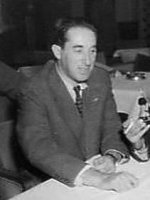Iouri Lioubimov is a Actor Russe born on 30 september 1917 at Yaroslavl (Russie)
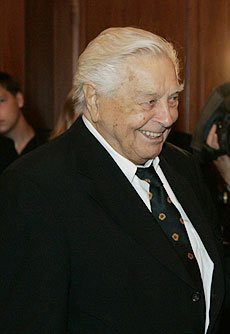
Yuri Petrovich Lyubimov (Russian: Ю́рий Петро́вич Люби́мов; 30 September [O.S. 17 September] 1917 – 5 October 2014) was a Soviet and Russian stage actor and director associated with the internationally renowned Taganka Theatre, which he founded in 1964. He was one of the leading names in the Russian theatre world.
He was a member of Mikhail Chekhov's Second Moscow Art Theater from 1934 to 1936. During the 1930s, he also met Vsevolod Meyerhold, the avant-garde director. Lyubimov worked in the Song and Dance Ensemble of the NKVD, where he met and befriended Dmitri Shostakovich, Nikolai Erdman and many others.
After service in the Soviet Army during the World War II, Lyubimov joined the Vakhtangov Theatre (founded by Yevgeny Vakhtangov). In 1953, he received the USSR State Prize. Lyubimov started teaching in 1963 and formed the Taganka Theatre the following year. Under Lyubimov, the theatre rose to become the most popular in Moscow, with Vladimir Vysotsky and Alla Demidova as the leading actors. In 1971 Shakespeare's Hamlet became one of Lyubimov's highly successful and much acclaimed productions.
Long a Soviet underground classic, Mikhail Bulgakov's novel The Master and Margarita was finally brought to the Russian stage at the Taganka in 1977, in an adaptation by Lyubimov.
According to B. Beumers, the major innovations Lyubimov has brought to theatrical history are the creation of a new theatrical genre, the poetic theatre, in which all revolves around one metaphor, and the creation of a new form of dramatic material, which incorporates a historical and biographical context. Lyubimov's performances — including the well-known Antiworlds, Pugachev, Listen!, and Comrade, believe, as well as newer Before and After, Oberiuty, and Honey — are fed and filled with poetic energy. In another performance, Fallen and Living, Yuri Lyubimov and David Samoilov built on verses by Pavel Kogan, Semyon Gudzenko and other poets of the WWII generation.
After Vysotsky's death in 1980, all of Lyubimov's productions were banned by the Communist authorities. In 1984, he was stripped of Soviet citizenship. Thereupon he worked abroad before returning to the Taganka Theatre in 1989. His staging of Eugene Onegin premiered in the Taganka on his 85th birthday to much critical acclaim.
While in the West he maintained a busy directing career. In the United States he directed Crime and Punishment at Arena Stage and Lulu at the Lyric Opera of Chicago. In 1983 he directed Crime and Punishment in London, winning the Evening Standard Award for Best Director. His effort to re-stage his famous The Master and Margarita at the American Repertory Theater failed to materialize because of a disagreement with the management of that company. In 1989, his Russian citizenship was restored.
In June 2011, before a performance of Bertolt Brecht's play The Good Person of Szechwan in Czech, the actors of Taganka refused to rehearse unless they were paid first. Lyubimov paid the money and left the theatre. "I've had enough of this disgrace, these humiliations, this lack of desire to work, this desire just for money", he said. Lyubimov retired from the theatre the following week. Two leading actors of theatre, Dmitry Mezhevich and Alla Smirdan, as well as some administrative assistants, followed Lyubimov. His dramatization of Dostoevsky's Demons premiered the next year.
In June 2013 Lyubimov staged Alexander Borodin's Prince Igor at the Bolshoi Theatre, which was warmly received by audiences and critics. The new Prince Igor is shorter, with Lyubimov cutting out some parts of the opera. According to Vassily Sinaisky, the Bolshoi chief conductor, such a new structure of the opera was conceived to make it more dynamic and intense.
Lyubimov has staged over 100 dramas and operas. "People tried to stick me with the label of political theater. But that's wrong. I was engaged in an aesthetic, in the expansion of the palette — what shades could be added in working with space and style," he says. Leonardo Shapiro concludes that "Lyubimov is probably best known for his daring theatrical adaptations of poetry and novels and his successful (and sometimes unsuccessful) run-ins with Soviet Premiers and Ministers of Culture over forbidden material."
As an actor he performed in 37 plays and 17 films, and several remain classics today.
Vladimir Vysotsky dedicated some of his famous songs (including "It's Not Evening Yet") to Yuri Lyubimov.
Lyubimov, a director who dominated Russian theatre for half a century, died at 97, after being admitted to the Botkin Clinic in Moscow with heart failure.
Source : Wikidata
Iouri Lioubimov

Birth name Любимов, Юрий Петрович
Nationality Russie
Birth 30 september 1917 at Yaroslavl (Russie)
Death 5 october 2014 (at 97 years) at Moscow (Russie)
Awards State Stalin Prize, Medal of Zhukov, Medal "For the Victory over Germany in the Great Patriotic War 1941–1945"
Nationality Russie
Birth 30 september 1917 at Yaroslavl (Russie)
Death 5 october 2014 (at 97 years) at Moscow (Russie)
Awards State Stalin Prize, Medal of Zhukov, Medal "For the Victory over Germany in the Great Patriotic War 1941–1945"
Biography
Yuri Lyubimov was born in Yaroslavl in 1917. His grandfather was a kulak who fled to Moscow to escape arrest during the collectivisation. Lyubimov's father, Pyotr Zakharovich, was a merchant, who worked for a Scottish company, and his mother, Anna Alexandrovna, was a half-Russian and half-Gypsy schoolteacher. They moved to Moscow in 1922, where both were arrested. Lyubimov studied at the Institute for Energy in Moscow.He was a member of Mikhail Chekhov's Second Moscow Art Theater from 1934 to 1936. During the 1930s, he also met Vsevolod Meyerhold, the avant-garde director. Lyubimov worked in the Song and Dance Ensemble of the NKVD, where he met and befriended Dmitri Shostakovich, Nikolai Erdman and many others.
After service in the Soviet Army during the World War II, Lyubimov joined the Vakhtangov Theatre (founded by Yevgeny Vakhtangov). In 1953, he received the USSR State Prize. Lyubimov started teaching in 1963 and formed the Taganka Theatre the following year. Under Lyubimov, the theatre rose to become the most popular in Moscow, with Vladimir Vysotsky and Alla Demidova as the leading actors. In 1971 Shakespeare's Hamlet became one of Lyubimov's highly successful and much acclaimed productions.
Long a Soviet underground classic, Mikhail Bulgakov's novel The Master and Margarita was finally brought to the Russian stage at the Taganka in 1977, in an adaptation by Lyubimov.
According to B. Beumers, the major innovations Lyubimov has brought to theatrical history are the creation of a new theatrical genre, the poetic theatre, in which all revolves around one metaphor, and the creation of a new form of dramatic material, which incorporates a historical and biographical context. Lyubimov's performances — including the well-known Antiworlds, Pugachev, Listen!, and Comrade, believe, as well as newer Before and After, Oberiuty, and Honey — are fed and filled with poetic energy. In another performance, Fallen and Living, Yuri Lyubimov and David Samoilov built on verses by Pavel Kogan, Semyon Gudzenko and other poets of the WWII generation.
After Vysotsky's death in 1980, all of Lyubimov's productions were banned by the Communist authorities. In 1984, he was stripped of Soviet citizenship. Thereupon he worked abroad before returning to the Taganka Theatre in 1989. His staging of Eugene Onegin premiered in the Taganka on his 85th birthday to much critical acclaim.
While in the West he maintained a busy directing career. In the United States he directed Crime and Punishment at Arena Stage and Lulu at the Lyric Opera of Chicago. In 1983 he directed Crime and Punishment in London, winning the Evening Standard Award for Best Director. His effort to re-stage his famous The Master and Margarita at the American Repertory Theater failed to materialize because of a disagreement with the management of that company. In 1989, his Russian citizenship was restored.
In June 2011, before a performance of Bertolt Brecht's play The Good Person of Szechwan in Czech, the actors of Taganka refused to rehearse unless they were paid first. Lyubimov paid the money and left the theatre. "I've had enough of this disgrace, these humiliations, this lack of desire to work, this desire just for money", he said. Lyubimov retired from the theatre the following week. Two leading actors of theatre, Dmitry Mezhevich and Alla Smirdan, as well as some administrative assistants, followed Lyubimov. His dramatization of Dostoevsky's Demons premiered the next year.
In June 2013 Lyubimov staged Alexander Borodin's Prince Igor at the Bolshoi Theatre, which was warmly received by audiences and critics. The new Prince Igor is shorter, with Lyubimov cutting out some parts of the opera. According to Vassily Sinaisky, the Bolshoi chief conductor, such a new structure of the opera was conceived to make it more dynamic and intense.
Lyubimov has staged over 100 dramas and operas. "People tried to stick me with the label of political theater. But that's wrong. I was engaged in an aesthetic, in the expansion of the palette — what shades could be added in working with space and style," he says. Leonardo Shapiro concludes that "Lyubimov is probably best known for his daring theatrical adaptations of poetry and novels and his successful (and sometimes unsuccessful) run-ins with Soviet Premiers and Ministers of Culture over forbidden material."
As an actor he performed in 37 plays and 17 films, and several remain classics today.
Vladimir Vysotsky dedicated some of his famous songs (including "It's Not Evening Yet") to Yuri Lyubimov.
Lyubimov, a director who dominated Russian theatre for half a century, died at 97, after being admitted to the Botkin Clinic in Moscow with heart failure.
Usually with
Filmography of Iouri Lioubimov (6 films)
Actor
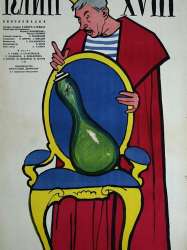
Cain the XVIII-th (1963)
, 1h34Genres Fantasy, Adventure, Romance
Themes Films based on plays
Actors Lidiya Sukharevskaya, Alexandre Demianenko, Erast Garine, Iouri Lioubimov, Rina Zelionaïa, Mikhaïl Glouzski
Roles Prime Minister
Rating66%





A famous inventor ("The Professor") creates an extra-powerful weapon—an explosive mosquito. King Cain XVIII dreams of conquering the world and marrying the princess, but she is also loved by Yan, a vagrant musician. Yan's love leads him to surmount many obstacles and simultaneously thwart the insidious plans of the king.

Belinsky (1953)
, 1h42Directed by Grigori Kozintsev
Genres Drama
Actors Aleksandr Borisov, Georgy Vitsin, Iouri Lioubimov
Roles Frolov
Rating64%





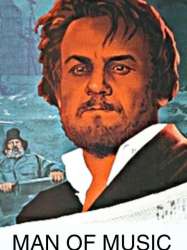
Man of Music (1952)
Directed by Grigori Alexandrov
Origin Russie
Genres Drama, Historical, Musical
Themes Films about music and musicians, Films about classical music and musicians, Musical films
Actors Lioubov Orlova, Andrei Popov, Vladimir Saveliev, Georgy Vitsin, Iouri Lioubimov, Rina Zelionaïa
Roles Alexander Dargomishky
Rating64%





The young composer Mikhail Glinka performs his new work at a soiree at earl Vielgorsky's house. However, the public is accustomed to Western music, and reacts coldly to the creation of the composer. This makes him very sad, but soon he decides to go learn the art of music in Italy.

Cossacks of the Kuban (1950)
Directed by Ivan Pyriev
Origin Russie
Genres Comedy, Musical theatre, Musical, Romance
Actors Marina Ladynina, Klara Loutchko, Ekaterina Savinova, Iouri Lioubimov, Boris Andreyev
Roles Andrei
Rating63%





Le film raconte la vie des kolkhozes (fermes collectives). C'est l'histoire d'une femme qui n'est pas mariée (exemple parfait des fermiers soviétiques qui travaillent avant de se marier) mais dont un cosaque est amoureux. Le film se termine par la demande en mariage du cosaque.
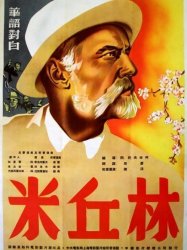
Life in Bloom (1949)
, 1h39Directed by Alexandre Dovjenko
Genres Drama, Biography
Actors Serge Bondartchouk, Iouri Lioubimov, Viktor Khokhryakov, Mikhail Zharov, Alekseï Konsovski, Klara Loutchko
Roles translator
Rating57%





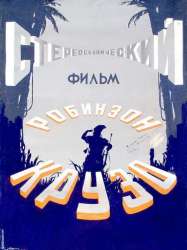
Robinson Crusoe (1947)
, 1h25Origin Russie
Genres Drama, Adventure
Themes Films based on Robinson Crusoe
Actors Pavel Kadotchnikov, Iouri Lioubimov
Roles Friday
Rating65%





The story of the film is based on the novel of Robinson Crusoe.
 Connection
Connection




